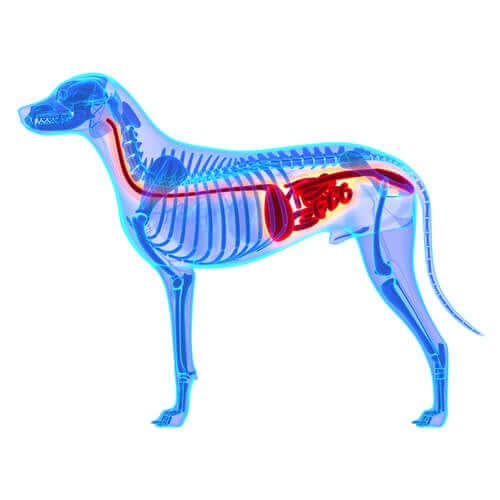Tips for Feeding Dogs with a Sensitive Stomach

Dogs with a sensitive stomach need special attention. Otherwise, their condition can certainly lead to more severe reactions.
Dogs suffering from a sensitive stomach can develop a wide range of symptoms. These include seasonal or respiratory allergies, itchy skin, and hair problems. In addition, episodes of diarrhea and the inability to gain weight are also common in these cases.
Similarly, its association with immune system diseases such as arthritis, irritable bowel disease, diabetes, and a number of other problems have also been reported.
Leaky gut syndrome as a base pathology
Normally, the walls of the intestine are a permeable epithelium. That’s the key to being able to get nutrients from food. This permeability in health conditions is selective, i.e. there’s strict control of which substances enter the gut into the bloodstream.
In the case of leaky gut syndrome, the intestine’s selective ability is lost. As a result, fragments of partially digested food, toxins, and bacteria cross over into the intestinal barrier.

This increased permeability leads to digestion problems, such as incomplete absorption of nutrients.
Leaky gut syndrome provokes the presence of compounds in the blood that the immune system identifies as foreign invaders.
In the face of this detected attack, the immune system is activated, responding with its usual defense mechanism. As a result, this causes inflammation and allergic reactions.
The challenges of feeding a dog with a sensitive stomach
After having intestinal damage, the dog’s body begins to perceive food as its enemy. For this reason, we see so many dogs that are allergic or reactive to almost all proteins, many vegetables, and grains.
This leaves not many choices when it comes to feeding them. The most important (and unfortunate) thing about this condition is that the dog falls into a chronic and constant state of inflammation, discomfort, and distress.
How to treat a dog with leaky gut syndrome?
The key to treating leaky gut syndrome in dogs is finding out what will close those gaps. Below, we’ll discuss how to use diet and some natural tips that can help when caring for a dog with a sensitive stomach.
We recommend a three-step strategy:
- Eliminating inflammation
- Take advantage of your dog’s diet to help it heal
- Tuning the dog’s hyperreactive immune system
1. Eliminating inflammation
Some of the most destructive irritants in the digestive system are things we give our dogs regularly: vaccines and medications.
Vaccines challenge the immune system by forcing it to treat a disease unnaturally. Each year, our dogs’ immune system is attacked by combined vaccines that force a confusing immune response.
Consider spacing vaccination out rather than doing it annually. Of course, the only exception is rabies, which is regulated by law and must be administered at least every three years.
There is research now showing that a single vaccine can effectively protect your dog for seven years or more. However, to make sure of this, you can request a blood test that checks antibody levels against central diseases.
On the other hand, in the case of medications for ticks and heartworm, try using natural repellents during cold seasons. If you give your dog medication for fleas and heartworm, it’s good to follow up with a detox using herbs like milk thistle.

2. Take advantage of your dog’s diet
The most harmful irritant to your dog’s intestine is its diet. Commercially processed croquettes and canned foods are the cause of the miseries that many dogs with a sensitive stomach suffer.
These foods’ inert ingredients provide inadequate nutrition that’s difficult to digest, is inflammatory, and even potentially toxic.
The truth is that many of the ingredients inside dog food put our pets at risk of suffering from leaky gut syndrome, obesity, and allergies. Moreover, the feed can be an indirect cause for other conditions such as diabetes, arthritis and inflammation, irritable bowel syndrome, food intolerance and sensitivities, and nutritional deficiencies.
Thus, it’s desirable to avoid excess carbohydrates, especially in the form of grains, commercially processed foods, and dairy products.
The best thing for dogs with a sensitive stomach is fresh food. This includes vegetables, fruits, and meat, even raw meat. Your dog needs a diet full of live enzymes, bioavailable nutrients, protective antioxidants, healthy fats, abundant proteins, and stimulants for their immune systems.
Diet examples
- Meat: They must be rich in omega-3 and omega-six fatty acids so as not to cause further inflammation. These may include turkey, salmon, duck, deer, and other wild animals. Wild fish is very welcome. However, chicken and pork are too high in omega 6 and won’t help your dog heal.
- Vegetables: They are a source of vitamins, minerals, and fiber. Use green leafy vegetables such as broccoli, spinach and kale, and orange-yellow vegetables such as pumpkin, peppers, and carrots. In addition, other possibilities include mushrooms, green beans, cauliflower, Brussels sprouts, and cabbage. These options are low in carbohydrates and high in fiber, antioxidants, vitamins and minerals.
- Fruits: In small amounts, they can provide benefits. Blueberries, blackberries, raspberries, apples and many other fruits are excellent additions. Nevertheless, always make sure the fruit is safe to give to your dog before offering it to them.
3. Supplements to regulate the immune system
In addition to giving your pet a balanced diet according to their needs, you may consider giving them some natural supplements to help regulate their immune system:
- Bone Broth: Bone Broth contains amino acids such as proline, glycine, and L-glutamine that are necessary to cure gut problems.
- Prebiotics and Probiotics: These supplements support the balance of good bacteria living in your dog’s microbiome.
- Kefir: Another great source of probiotics. You can use goat’s milk kefir or coconut water.
- Digestive enzymes: These help break down food particles before they leave the intestine, reducing any observable symptoms.
- Turmeric: Turmeric is said to have anti-inflammatory, antibacterial, and antifungal properties, and so its consumption – within a balanced diet – would be advisable.
- Ginger: Stimulates digestive enzymes and increases bile production to improve digestive functions.

Dogs with a sensitive stomach need a proper diet
Properly feeding a dog with a sensitive stomach is a continuous commitment. It doesn’t work to give the dog a healthy diet long enough for it to get better and then return to commercial products and snacks of any kind. As a result, the owner will end up having to repeat the whole process all over again.
Of course, this is totally avoidable. It’s up to you as a responsible owner to ensure your best friend has a healthy life. It’s the best way to return all the love they give to you unconditionally.
All cited sources were thoroughly reviewed by our team to ensure their quality, reliability, currency, and validity. The bibliography of this article was considered reliable and of academic or scientific accuracy.
- Feijoó, S. M. (2009). Enfermedad Intestinal Inflamatoria (EII). Revista Veterinaria Argentina. 26:(258) 1-11.
- Sunyer, I., Serrano, S., Pulido, I., & Domenech Tomás, O. (2002). Shock séptico y síndrome de respuesta inflamatoria sistémica (SRIS) en pequeños animales. Clínica veterinaria de pequeños animales, 22(2), 0085-99.
- Bolívar, R., & Fair, C. (2017). Manejo de un paciente canino con enfermedad inflamatoria intestinal (Doctoral dissertation, Corporación Universitaria Lasallista).
- Ludlow, C. (2005). Hydrolyzed proteins: what, when and why. In Proceeding of the NAVC North American Veterinary Conference.
